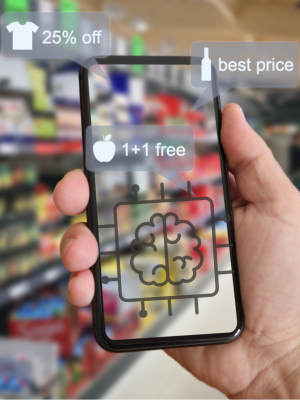Smartphones and Artificial Intelligence: A Synergy of Convenience and Innovation
Posted by iCoverLover on Nov 16, 2023
The implementation of Artificial Intelligence (AI) in smartphones is revolutionising the way we interact with our devices, making them not just tools but intelligent assistants capable of learning and adapting to our needs. Here's a detailed exploration of how AI is implemented in smartphones:
1. Enhanced User Experience
Personalised Recommendations: AI algorithms delve into the nuances of user preferences by analysing past app usage, search history, and interaction patterns. This data-driven approach allows smartphones to suggest relevant apps, contacts, and content that align closely with individual interests and habits.
Adaptive Brightness and Battery Management: Using AI, smartphones can intelligently adjust screen brightness in real-time based on ambient light and learned user preferences. Similarly, AI optimises battery consumption by analysing usage patterns, such as the most-used apps and typical charging times, thereby extending battery life and enhancing overall device performance.
2. Camera Technology
Scene Recognition: AI in smartphone cameras goes beyond basic image capture; it can identify various scenes and objects (like landscapes, portraits, or night scenes) and automatically adjust camera settings like exposure, focus, and colour balance to capture the best possible photo.
Portrait Modes: AI-driven algorithms facilitate advanced portrait modes, using depth sensing and edge detection to distinguish between the subject and the background, enabling professional-grade depth-of-field effects and background blur (bokeh).
3. Voice Assistants and Speech Recognition
Natural Language Processing (NLP): AI empowers voice assistants to comprehend and process human speech more naturally and accurately. This includes understanding context, managing complex queries, and even recognising different user voices for personalised interactions.

Speech-to-Text Accuracy: Enhanced by AI, speech-to-text services offer greater accuracy in transcribing spoken words into text, learning from user speech patterns and accents for improved responsiveness and fewer errors.
4. Security Enhancements
Face Recognition: AI-based facial recognition systems utilise advanced algorithms to accurately and securely identify a user's face, often incorporating depth sensing to prevent spoofing with photographs or videos.
Anomaly Detection: By constantly learning normal user behaviour, AI can flag unusual activities or potential security breaches, like unfamiliar login attempts or unexpected changes in usage patterns.
5. Augmented Reality (AR) and Gaming

AR Experiences: AI augments AR capabilities by providing more accurate and real-time object recognition, spatial awareness, and interactive experiences, thus enriching gaming, educational, and practical applications.
Gameplay Enhancement: AI optimises in-game performance by adjusting graphics quality and gameplay difficulty in real-time, and even personalising game content based on player behaviour and preferences.
6. Health and Fitness Tracking
Activity Recognition: Utilising sensors and AI, smartphones can accurately track and differentiate various physical activities like walking, running, or cycling, offering insightful analysis and suggestions for fitness routines.
Health Monitoring: AI algorithms process sensor data to provide health insights, such as heart rate monitoring, sleep analysis, and even stress levels, often sending alerts for any anomalies or health concerns.
7. Connectivity and Network Optimisation
Smart Connectivity: AI enhances network performance by intelligently switching between Wi-Fi and cellular networks, optimising for the best available connection based on signal strength, speed, and usage patterns.
Data Management: AI-driven data management ensures efficient use of data plans by learning which apps and services consume the most data and adjusting their background activity accordingly.
8. Language Translation and Global Connectivity
Real-Time Translation: AI-powered translation tools break language barriers by providing instantaneous and accurate translations, both in text and in spoken form, facilitating seamless global communication.
Multilingual Support: Enhanced support for multiple languages in interfaces and voice commands, powered by AI, allows for a more inclusive and accessible user experience across different linguistic demographics.
9. Predictive Text and Keyboard Customisation
Smart Keyboards: AI enhances predictive text input, suggesting the next word or phrase based on the context of the conversation and individual typing habits, thus improving overall typing efficiency.
Auto-Correction and Learning: The keyboard dynamically adapts to individual typing patterns, learning from corrections and custom phrases to provide more accurate auto-corrections over time.
10. Content Curation and Media Consumption
Recommendation Systems: Leveraging AI, smartphones can curate personalised content feeds, including news, music, and videos, based on user interests, past interactions, and even the time of day.
Adaptive Streaming: AI optimises streaming quality in real-time, adjusting resolution and bitrate based on available bandwidth and viewing conditions to deliver the best possible media experience.
Conclusion
The integration of AI into smartphones represents a paradigm shift in how we interact with technology. It's not just about smarter phones; it's about devices that understand and adapt to our unique preferences and habits. With ongoing advancements in AI, the potential for even more personalised, efficient, and intuitive smartphone experiences is immense, making these devices truly indispensable in our daily lives.
